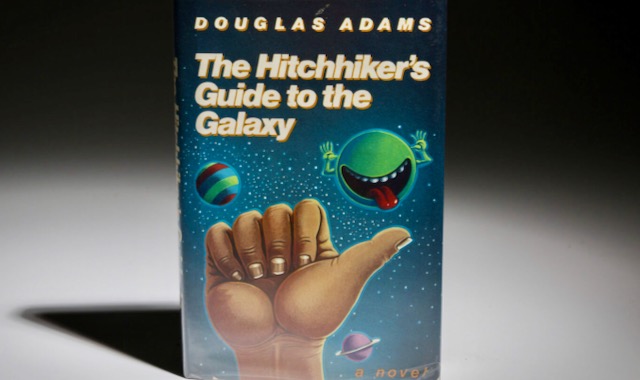The second book (alphabetically) on “The Ruud List of the 100 Best Books to Love in the English Language” is Douglas Adams’ sci-fi romp The Hitchhiker’s Guide to the Galaxy, in which I am counting the entire five-book “trilogy” including the original Hitchhiker’s Guide (1979) and its sequels: The Restaurant at the End of the Universe (1980), Life, the Universe, and Everything (1982), So Long, and Thanks for All the Fish (1984), and Mostly Harmless (1992). They form, essentially, a continuous story anyway. As fans will know, there is a sixth installment, but Adams didn’t write it so I’m not counting it.
Though much loved (the books have sold more than 14 million copies worldwide), Hitchhiker’s Guide doesn’t tend to appear on many of these “Greatest Novels” lists, which tend to have a bias against unabashedly comic works. Still, Waterstone’s Books and Channel Four in the UK produced a list of “One Hundred Greatest Books of the Century” in 1996, which included Hitchhiker’s Guide at number 24; and the BBC’s “Big Read” of 2003, which tried to identify the UK’s “Best-Loved Book,” Hitchhiker’s Guide came in at number four.
It’s easy to see why the books are so popular. Adams has a unique talent for using language in unexpected and often hilarious ways, as in his famous description of the invading Vogon fleet in the first book: “The ships hung in the sky in much the same way that bricks don’t.”
But there is more to Adams than a witty punster. The books are a parody of serious science fiction (Adams started his career as a script editor for “Dr. Who”). But more than that they unflinchingly lampoon contemporary western society and pessimistically but humorously poke holes in the search for the ultimate meaning of the universe (which, as you will know if you’ve read the books, is actually 42). As Adams summarizes in The Restaurant at the End of the Universe, “The story so far: In the beginning the Universe was created. This has made a lot of people very angry and been widely regarded as a bad move.” And perhaps most seriously, it’s the human race that Adams finds the most absurd of all:
“For instance,” he writes, “on the planet Earth, man had always assumed that he was more intelligent than dolphins because he had achieved so much—the wheel, New York, wars and so on—whilst all the dolphins had ever done was muck about in the water having a good time. But conversely, the dolphins had always believed that they were far more intelligent than man—for precisely the same reasons.”
In case you aren’t familiar with the Hitchhiker’s Guide, let me just give you a quick summary of the beginning of the story: Arthur Dent, an Englishman from the West Country, is rescued by his friend Ford Prefect from the destruction of the planet Earth and all its human population by a fleet of Vogons, who are demolishing the Earth to make way for a hyperspace expressway. Ford and Arthur are able to stow away on a Vogon ship, where Ford discloses that he’s actually an alien from a small planet near Betelgeuse who for fifteen years has been disguised as an unemployed actor from Guildford , doing research on Earth for an intergalactic encyclopedia called the Hitchhiker’s Guide to the Galaxy. Of course, the Vogons discover the stowaways, and expel them from their ship through an airlock. Fortunately, a ship piloted by Ford’s “semi-cousin” Zaphod Beeblebrox, president of the galaxy happens to be passing by, having used its “Infinite Improbability Drive,” and rescues the two stowaways.
And so on.
The novels grew out of a BBC radio program that Adams wrote and aired between 1979-80. The novels then spawned a film and a TV series and, finally, an interactive computer program. And the novels have had further influences on contemporary culture: Babel Fish, the free online multi-language translation app launched in 1997, is named for the creature in Hitchhiker’s Guide that could instantly translate any alien language. Trillion, the software app that can connect to multiple instant messaging services, was named for another character on board Zapod Beeblebrox’s spaceship. And every year on the 25th of May, Adams admirers celebrate “Towel Day,” since, as explained in the trilogy, a towel is “the most massively useful thing an interstellar hitchhiker can have.” So this is not a subjective choice for the list: Hitchhiker’s Guide is a favorite of millions.

